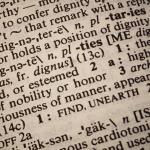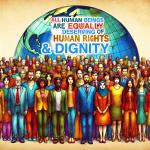I love this simple definition of grace from Dom Augustin Guillerand, O. Cart, a French Carthusian.
This is the secret of peace, after committing a fault. What is past is past. And if we accept the consequences, while bracing our will, we can be sure that God will know how to draw glory even from our faults. Not to be downcast after committing a fault is one of the marks of true sanctity, for the saint knows how to find God in everything, in spite of human appearances. Once your will is sincerely “good,” then don’t worry…
In all that we do, and at every moment, God has ordained an exact balance between what we have to do and the necessary strength to do it; and this we call grace. Our part is to bring ourselves into line with grace.
God uses all the horrors of this world for an infinitely perfect end, and always with an infinite calm. It is part of his plan that we should feel the blows and experience the wounds of life: but more than anything else he wants us to dominate them by virtues of faith, hope and charity, and so live on his level. It is these latter which will raise us up to him, and then we shall share in his calm, and in the highest part of our being.
We all understand something of the common horrors of the world. Not the outsized, earth-shattering events like the Holocaust, or the murder of JFK, or the attacks on 9/11. Those might be analogous to large packing trunks that we must check before we travel – we allow them to be stored and carried in the collective-conscience, shouldered and seen-to by so many unseen handlers that we can -for a time- put them from our minds, although our claim tickets will remind us that they too are in transit and that arrangements to collect them must be made.
We are more intimate, though, with the carry-on sized horrors; they are personal, portable, and we manage to store them in a temporary overhead. Over time we’re going to pull them down, drag them behind us, guard them closely and pack and repack them. These fit all the “little” shatterings of our lives – events that seem so picayune we dare not share them for fear of being mocked. “What? Kids laughed at you in gym? That’s what you carry around, like it’s so important? Let me tell you from horror.”
Versatile little buggers, they also fit the big shatterings – those foundation-cracking hurts that we can’t mention at all, or find ourselves broadcasting every minute of every day, either in our manner, our appearance, our compulsions, our insecurities, our addictions, our lusts or our demands.
To suggest that anyone manages to live from birth to death without encountering at least enough horror as to fill a carry-on bag is to expose a deficit in understanding and humanity. Even the most charmed life has a witch or two beneath the fairy-tail surface.
We do battle every day, mostly with ourselves, our past and our imperfect present. An echo of a chortled “you’re so stupid” can reduce your brilliant energy to near-catatonia. A memory of past abuse can destroy the intimacy of present relationships.
Worse is the memory of wounding another – of recognizing your culpability, seeing a wreck you’ve helped create. That can loom as large in the psyche as one’s hurts, if not larger. A recognized villainy against another can break the back with its weight. It is a sort of extendable baggage; it grows heavier and fuller until -if forgiveness is not sincerely sought and in some measure obtained- it causes you to overcompensate, to lean too far in another direction in order to haul it about. Eventually, unless you ask for help -for grace- you pull the thing on top of yourself and you let it crush you, because righting yourself just seems too aggressive, suspicious and lacking in contrition.
Recently I wrote that “failure to love” is killing Europe, but perhaps what is killing Europe is that recognition of villainy. To look at the Holocaust and know it was permitted to happen; to look at the Gulags, and see what was not stopped. An epic fail in love and humanity.
Forgiveness has been sought by some, not by others, and some measure of forgiveness has been obtained, but since World War II has Europe been unable to forgive itself? Increasingly secular, Europe is hauling its huge baggage and forever leaning left, left, left, trying to overcompensate for its weight. It is not seeking help; it is not seeking grace. It seems to dare the toppling crush.
Currently, our president is seeking pardon for American villainy from nearly everyone he meets, regardless of what baggage they may be dragging, themselves. Some say he needn’t apologize at all, but that is unlikely. No nation is without its sins and errors. But is he apologizing much more than he needs to?
That is a more interesting question, because it suggests something illusory – a magician’s distraction. Is he pretending to drag a heavy bag of sins specifically so that he might overcompensate for them and lean further left, and left and left? Do our real-and-imagined victims understand the precise (and lesser) weight of the thing, but pretend otherwise because the illusion serves both his needs and their purposes?
If this is all a showman’s misdirection, there is no need to seek grace, and so none is anticipated. Is the president only pretending to desire forgiveness, and thus toying with grace? In that case, we are not so much daring to be crushed but inviting it.
In our church, the number of villains has been relatively small, but the relative hurt is incalculable, affecting untold millions in mind, body and spirit. Where there is great good, there is also great evil. Our good pope has made a beginning in seeking forgiveness, and in America there has been sound policies put in place for villain-detection and hurt-prevention.
Some forgiveness will come, and help has been sought, grace has been requested, because without it the baggage would be immovable; we would not be crushed under it, but dispirited-unto-abandonment. Having sought grace, we can move a little. We may be reduced in size -our forgiveness will not come without a hefty price- and we may be despised but we will never be dissolved, nor crushed.
What does this have to do with Dom Augustin? Well, he wrote a very simple line about grace:
In all that we do, and at every moment, God has ordained an exact balance between what we have to do and the necessary strength to do it; and this we call grace. Our part is to bring ourselves into line with grace. God uses all the horrors of this world for an infinitely perfect end, and always with an infinite calm.
This is important. If God uses all the horrors of the world, then He is taking us at our best, and at our worst, in our victimhood and in our villainy. If we can “bring ourselves into line with grace” (and He has given us the tools, sacraments, instructions and the mercies to do that) then we can bring some balance to our baggage. We need not destroy ourselves in our guilts or our grievances. We need not allow ourselves to be crushed under the weight.
We can actually check those bags, along with the bigger bags, those “collective” bags that we are allowing unseen “others” to handle. God Himself carries them for us with infinite calm, to a perfect end.
We are engaged in great battles, each of us. Interior battles, and exterior. Personal and national, material and spiritual. But if we can bring ourselves into line with grace, if we can allow ourselves to believe in “the perfect end,” we can move forward, upright and with a measure of surety and optimism, sharing “in his calm, and in the highest part of our being.”
That is not as easy as it sounds.
In fact, to surrender to grace, to believe in grace, to hold on to the long-view and be the saint who knows “how to find God in everything, in spite of human appearances,” is the most difficult thing in the world, because it takes a daily fiat. An hourly fiat. Sometimes a minute-by-minute whispering of “yes.” Assents in nano-seconds.
The life of a believer is not for wimps.
*Title changed thanks to a suggestion by Gerard Vanderleun, who is full of good suggestions. Thanks, sir.















